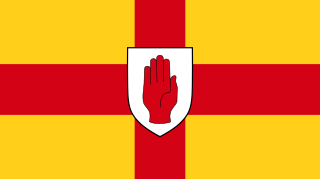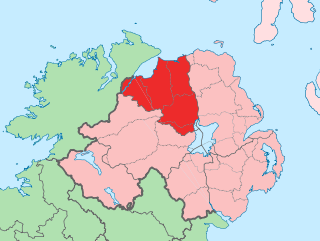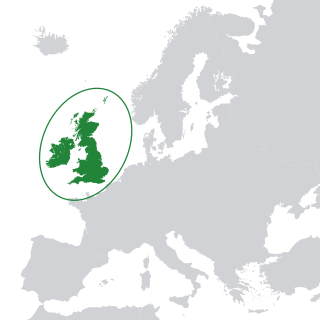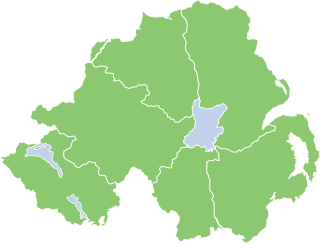Ulster is one of the four provinces of Ireland, located in the northern part of the island.
Contents
Ulster may also refer to:
Ulster is one of the four provinces of Ireland, located in the northern part of the island.
Ulster may also refer to:

Northern Ireland is a part of the United Kingdom in the north-east of the island of Ireland that is variously described as a country, province or region. Northern Ireland shares an open border to the south and west with the Republic of Ireland. At the 2021 census, its population was 1,903,175, making up around 3% of the UK's population and 27% of the population on the island of Ireland. The Northern Ireland Assembly, established by the Northern Ireland Act 1998, holds responsibility for a range of devolved policy matters, while other areas are reserved for the UK Government. The government of Northern Ireland cooperates with the government of Ireland in several areas under the terms of the Belfast Agreement. The Republic of Ireland also has a consultative role on non-devolved governmental matters through the British–Irish Governmental Conference (BIIG).

Ulster is one of the four traditional or historic Irish provinces. It is made up of nine counties: six of these constitute Northern Ireland ; the remaining three are in the Republic of Ireland.

County Londonderry, also known as County Derry, is one of the six counties of Northern Ireland, one of the thirty-two counties of Ireland and one of the nine counties of Ulster. Before the partition of Ireland, it was one of the counties of the Kingdom of Ireland from 1613 onward and then of the United Kingdom after the Acts of Union 1800. Adjoining the north-west shore of Lough Neagh, the county covers an area of 2,118 km2 (818 sq mi) and today has a population of about 252,231.
There are four provinces of Ireland: Connacht, Leinster, Munster and Ulster. The Irish word for this territorial division, cúige, meaning "fifth part", suggests that there were once five, and at times Meath has been considered to be the fifth province. In the medieval period, however, there were often more than five. The number of provinces and their delimitation fluctuated until 1610, when they were permanently set by the English administration of James I. The provinces of Ireland no longer serve administrative or political purposes but function as historical and cultural entities.
Campbell may refer to:

Ulster Rugby is one of the four professional provincial rugby union teams from the island of Ireland. They compete in the Irish regional pool of the United Rugby Championship and in the European Rugby Champions Cup, each of which they have won once. Ulster were the first Irish team and the first team outside England and France to win the European Cup in 1999.
Scotch-IrishAmericans are American descendants of primarily Ulster Scots people who emigrated from Ulster to the United States during the 18th and 19th centuries. Their ancestors had originally migrated to Ulster mainly from the Scottish Lowlands and Northern England in the 17th century. In the 2017 American Community Survey, 5.39 million reported Scottish ancestry, an additional 3 million identified more specifically with Scotch-Irish ancestry, and many people who claim "American ancestry" may actually be of Scotch-Irish ancestry.

Ulster is one of the four provinces of Ireland. Due to large-scale plantations of people from Scotland and England during the 17th and 18th centuries, as well as decades of conflict in the 20th, Ulster has a unique culture, quite different from the rest of Ireland. As all of Northern Ireland lies within Ulster and comprises about 90% of its population, the culture of Northern Ireland is very similar to that of the whole of Ulster. In particular, the Ulster Scots, or Scots Irish identity is strong among descendants of the Plantation, notably in counties Antrim, Cavan, Donegal, and Down. There is also a thriving indigenous Gaelic culture, largely attributed to the GAA and Conradh na Gaeilge.

Dundonald is a large settlement and civil parish in County Down, Northern Ireland, United Kingdom. It lies east of Belfast and is often considered a suburb of the city. It is home to the Ulster Hospital, Dundonald International Ice Bowl, Dundonald Omnipark, has a Park and Ride facility for the Glider, access to the Comber Greenway and several housing developments. John de Courcey established a keep including a motte-and-bailey in the 12th century. This is known as Moat Park and can be accessed from Church Green, Comber Road and the Upper Newtownards Road.

The flag of Ulster is a banner based on the coat of arms of Ulster, used to represent Ulster, one of the four provinces of Ireland. It consists of a red cross on a gold background with a red hand on a white shield in the centre.

The terminology of the British Isles comprises the words and phrases that are used to describe the geographical and political areas of the islands of Great Britain and Ireland, and the smaller islands which surround them. The terms are often a source of confusion, partly owing to the similarity between some of the actual words used but also because they are often used loosely. Many of the words carry geographical and political connotations which are affected by the history of the islands. The inclusion of Ireland in the geographical definition of British Isles is debated. Ordnance Survey Ireland does not use the term.
There are a number of alternative names for Northern Ireland. Northern Ireland consists of six historic counties of Ireland, and remains part of the United Kingdom following the independence of the other twenty-six counties as the Irish Free State in 1922. In addition to, and sometimes instead of, its official name, several other names are used for the region. Significant differences in political views between unionists and Irish nationalists are reflected in the variations of names they use for the region. A proposal to change Northern Ireland's legal name to Ulster was seriously considered by the UK and Northern Ireland Governments in 1949 but in the end, the name "Northern Ireland" was retained.

The Partition of Ireland was the process by which the Government of the United Kingdom of Great Britain and Ireland (UK) divided Ireland into two self-governing polities: Northern Ireland and Southern Ireland. It was enacted on 3 May 1921 under the Government of Ireland Act 1920. The Act intended both territories to remain within the United Kingdom and contained provisions for their eventual reunification. The smaller Northern Ireland was duly created with a devolved government and remained part of the UK. The larger Southern Ireland was not recognised by most of its citizens, who instead recognised the self-declared 32-county Irish Republic. On 6 December 1922, Ireland was partitioned. At that time, the territory of Southern Ireland left the UK and became the Irish Free State, now known as the Republic of Ireland.
Newcastle usually refers to:

Sport in Northern Ireland plays an important role in the lives of many Northern Irish people. Most sports are organised on an all-Ireland basis, for example rugby union, Gaelic games, basketball, rugby league, hockey, and cricket, whereas others, like association football and netball are organised on a separate basis for Northern Ireland.

Since 1922, the United Kingdom has been made up of four countries: England, Scotland, Wales and Northern Ireland. The UK Prime Minister's website has used the phrase "countries within a country" to describe the United Kingdom.
John O'Donnell may refer to:
Traynor is an English and Irish surname found throughout the world.